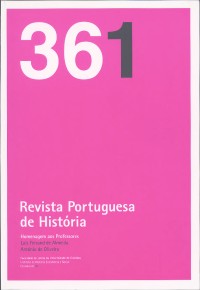Please use this identifier to cite or link to this item:
https://hdl.handle.net/10316.2/46106| DC Field | Value | Language |
|---|---|---|
| dc.contributor.author | Oliveira, António Resende de | - |
| dc.date.accessioned | 2019-03-27T11:20:29Z | |
| dc.date.accessioned | 2020-10-05T05:42:01Z | - |
| dc.date.available | 2019-03-27T11:20:29Z | |
| dc.date.available | 2020-10-05T05:42:01Z | - |
| dc.date.issued | 2003 | - |
| dc.identifier.issn | 0870-4147 | - |
| dc.identifier.uri | https://hdl.handle.net/10316.2/46106 | - |
| dc.description.abstract | O trovador Afonso Mendes de Besteiros dirigiu uma das suas cantigas de escárnio contra Rui Garcia de Paiva, personagem cuja presença junto de D. Afonso III está documentada entre 1263 e 1274. De acordo com a interpretação que tem prevalecido, tratar-se-ia de um ataque à pretença homossexualidade deste conselheiro régio. A análise da biografía de Rui Garcia e a reavaliação do significado do termo “arraiz”, central na leitura que tem sido feita da composição, permitem ensaiar uma reinter- pretação deste cantar, apesar de não estarem ainda resolvidos todos os problemas da restituição do texto. | por |
| dc.description.abstract | The troubadour Afonso Mendes de Besteiros addressed one of his scorn songs against Rui Garcia de Paiva, a person that some records show to have been in the entourage of king Afonso 3rd, as member of his Counsel, between 1263 and 1274. According to the interpretation which has prevailed until now, Afonso Mendes was blaming the royal counsellor for his supposed homosexuality. Nevertheless, the analysis of the biography of Rui Garcia and a new assessment of the word “arraiz” - which was crucial in the reading that, until now, has been made of this composition - allow us to essay a reinterpretation of the song, even if all the problems of textual restitution are not yet solved. | eng |
| dc.language.iso | por | - |
| dc.publisher | Imprensa da Universidade de Coimbra | - |
| dc.rights | open access | - |
| dc.title | Rui García de Paiva no escárnio galego-português | por |
| dc.type | article | - |
| uc.publication.collection | Revista Portuguesa de História nº 36 vol. 1 | - |
| uc.publication.firstPage | 285 | - |
| uc.publication.issue | 36 | - |
| uc.publication.lastPage | 295 | - |
| uc.publication.location | Coimbra | - |
| uc.publication.journalTitle | Revista Portuguesa de História | - |
| uc.publication.volume | 1 | por |
| dc.identifier.doi | 10.14195/0870-4147_36-1_12 | - |
| uc.publication.orderno | 15 | - |
| uc.publication.area | Artes e Humanidades | - |
| uc.publication.manifest | https://dl.uc.pt/json/iiif/10316.2/46106/271232/manifest?manifest=/json/iiif/10316.2/46106/271232/manifest | - |
| uc.publication.thumbnail | https://dl.uc.pt/retrieve/12208825 | - |
| item.grantfulltext | open | - |
| item.fulltext | With Fulltext | - |
| Appears in Collections: | Revista Portuguesa de História | |
Files in This Item:
| File | Description | Size | Format | |
|---|---|---|---|---|
| rui_garcia_de_paiva_no_escarnio.pdf | 223.96 kB | Adobe PDF |  |
Items in DSpace are protected by copyright, with all rights reserved, unless otherwise indicated.
